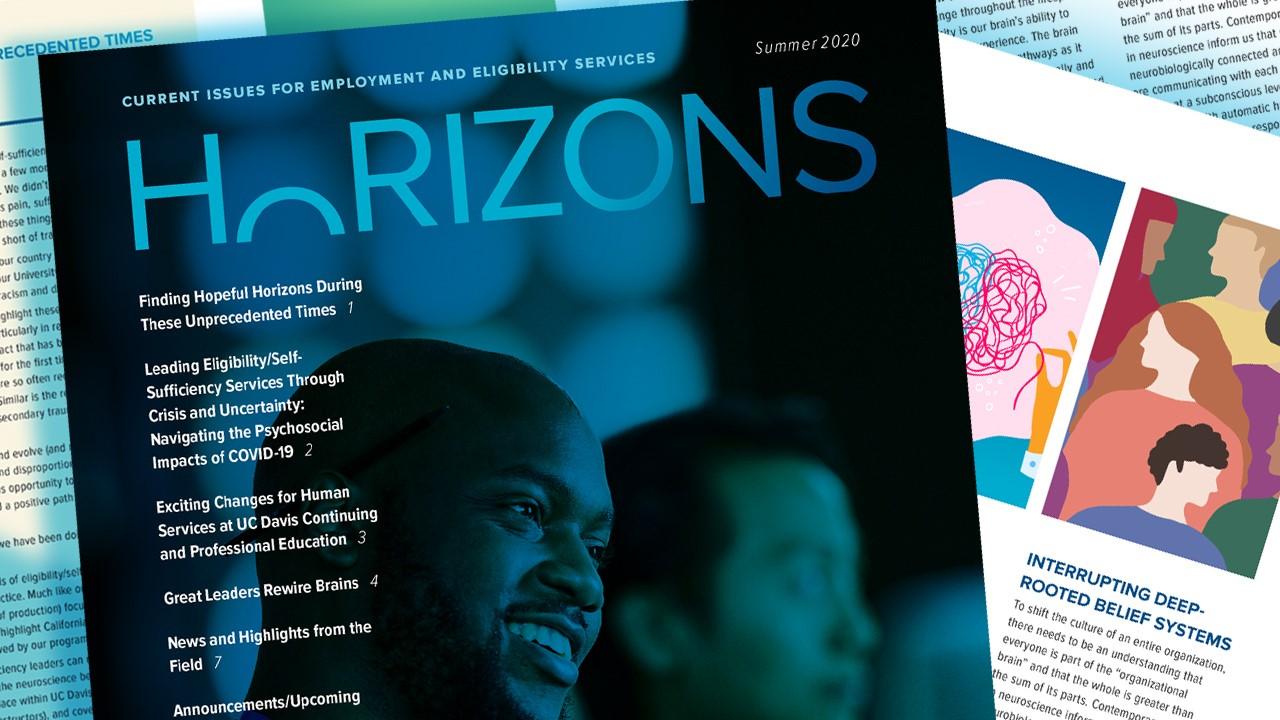
Finding Hopeful Horizons During These Unprecedented Times
By Susan Brooks, Department Chair, Human Services at UC Davis Continuing and Professional Education
When we first set out to launch a new community newsletter focused on eligibility/self-sufficiency services, we didn't yet know that a global pandemic was just around the corner. We didn't know that within a few months, the country would be facing a nationwide quarantine and more than 35 million new unemployment claims. We didn't know who George Floyd was, let alone anticipate that we'd be eternally connected to him after witnessing his pain, suffering and the ultimate injustice that was inflicted upon him. There were certainly warning signs that all of these things could happen, but the blunt force impact of these combined shocks to our communities has been nothing short of traumatic.
We at UC Davis would like to acknowledge the emotion and pain rippling through our country and communities right now. Our hearts are with the Black community. We stand with you. Furthermore, our University and its members stand in solidarity with all communities of color in earnest and vehement opposition to racism and discrimination.
While it's tempting—and in many ways appropriate—to abruptly shift course to highlight these unprecedented challenges for eligibility/self-sufficiency and virtually all other human services programs, particularly in relation to the volume of and complication to the work now before us, it is also an opportunity to highlight a fact that has been hiding in plain sight since this crisis began: This trauma we have all been experiencing—many of us for the first time at such a complicated and impactful level—is the reality in which the children and families we serve are so often required to function, only normally without the relative social safeguard of a global crisis to attach it to. Similar is the reality of our most valuable human services professionals, those on the front lines, who often experience secondary trauma as a result of their vital, high-stakes work.
While trauma-informed and culturally humble practices continue to emerge and evolve (and newer still is the focus on mitigating the impact of secondary trauma), working in and around trauma and disproportionality is and always has been at the forefront of our work. But what also comes with that is the tremendous opportunity to help vulnerable children and families mitigate the impact of trauma, focus on their strengths and find a positive path toward a hopeful horizon of safety, equity, self-sufficiency and well-being.
It is with some hope, then, that we know what needs to be done because we have been doing it all along. The world has certainly changed, but our overall mission has not.
The goal of this publication is to provide our valued colleagues in the fields of eligibility/self-sufficiency with a consistent series of timely, valuable resources that positively contributes to their practice. Much like our sister publication Reaching Out (which we're proud to mention is celebrating its 15th year of production) focuses on child welfare, this publication seeks to examine current research, share best practices and highlight California county and other successful jurisdictions' work to improve the outcomes of children and families served by our programs.
This inaugural issue will first examine ways in which eligibility/self-sufficiency leaders can navigate the psychosocial impacts of COVID-19, before moving more broadly toward focusing on the neuroscience behind leadership, coaching and learning. We'll also share news of some exciting changes taking place within UC Davis Continuing and Professional Education, highlight some upcoming programs (and one of our great instructors), and cover some exciting recent developments in the field.
Future issues will likely circle around a central topic, and here’s to hoping the next topic will focus on recovering from a crisis that is already (or nearly) behind us.
Whatever the future may hold, we know that we will never cease in our effort to provide quality training in all areas of workforce and organizational development for our valuable human services colleagues. Thank you for all you do. We hope you find this issue helpful and informative.
